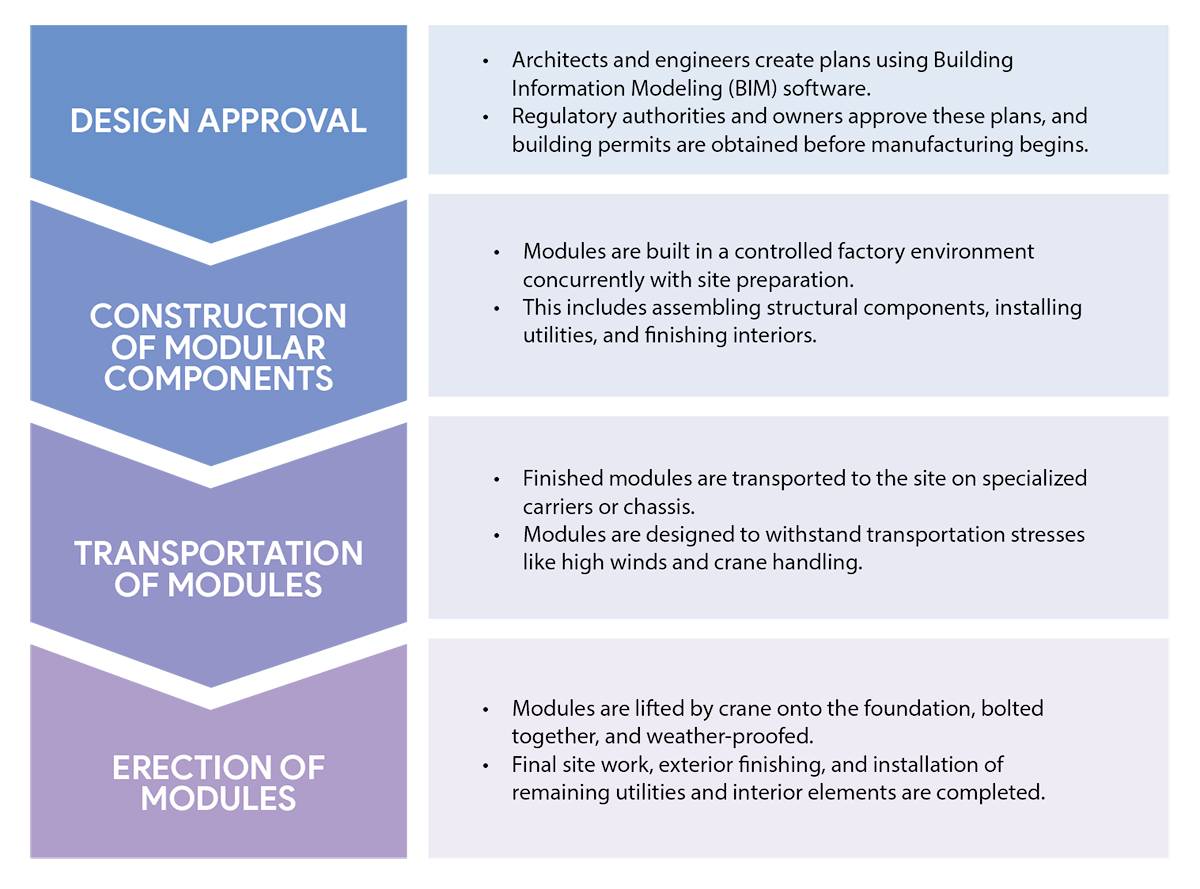Modular Construction Process, Decision Factors, and Incentives
Modular construction is revolutionizing the building industry by offering efficient, sustainable, and cost-effective solutions. Here’s a closer look at what it entails, who uses it, and why it is becoming an essential part of modern construction.
According to the Modular Building Institute (MBI), the non-profit trade association serving the modular construction industry internationally, modular construction is a transformative process in which buildings are constructed off-site under controlled plant conditions using the same materials and standards as conventional buildings but in about half the time. The process involves producing “modules” that, when assembled on-site, reflect the same design and specifications as traditional facilities without compromise.[1]
The Modular Construction Process
The following provides a general overview of the modular construction process.

Through its systematic, parallel construction approach, modular construction offers advantages such as shorter construction times, cost certainty, and enhanced safety.[2]
Who Uses Modular Construction?
- Healthcare and Long-Term Care: Expansion for hospitals, clinics, medical offices, and rehabilitation centers
- Education: Expansion of school facilities and student housing
- Municipalities: Multi-family housing, affordable housing, and temporary housing solutions
- Recreational: Sports facilities and community centers
Factors Driving the Adoption of Modular Construction
Several factors make modular construction a preferred choice across sectors, including significant advantages in speed, sustainability, labour efficiency, cost management, and quality control. Here’s a snapshot of key decision factors and related advantages.
| FACTORS | ADVANTAGES |
|---|---|
|
Speed and Efficiency
|
Streamlined Process: Simultaneous on-site preparation and off-site component fabrication significantly reduce construction timelines. Quicker Occupancy: Enables faster return on investment and less disruption to surrounding areas. |
|
Sustainability
|
Reduced Waste: Controlled environments produce less material waste and more efficient resource use. Environmental Benefits: Effective recycling processes contribute to sustainability goals. |
|
Labour Efficiency
|
Optimized Labour Resources: Factory-based production ensures consistent quality and addresses industry-wide labour shortages. |
|
Cost-Effectiveness
|
Cost Certainty: Minimizes wasteful expenditures and reduces risks associated with weather delays and site-specific challenges. Enhanced Project Value: Controlled manufacturing environments enhance overall project value. |
|
Quality Control
|
Consistent Standards: Factory settings ensure high-quality construction with fewer defects. Reliability and Stability: Controlled environments improve project timelines and material quality. |
Government Funding Incentives
In Ontario, several timely and time-sensitive government funding allocations are available for (LTC) construction projects, emphasizing efficiency, quality, and timely delivery. These provide further incentives for customers across these sectors to explore OECM’s Modular Buildings and Classroom Portables agreement for their upcoming projects now!
$201 Million for Postsecondary Infrastructure
• The Ontario government announced the allocation which includes $171 million through the Facilities Renewal Program (FRP) to help with critical maintenance, repairs, upgrades and renewal of existing college and university facilities, $20 million through the College Equipment and Renewal Fund (CERF) to help colleges buy and renew instructional equipment and learning resources, and $10 million through the Training Equipment and Renewal Fund to help universities renew and buy modern, state-of-the-art equipment and learning resources.
$1.3 Billion Funding for School Construction and Expansion
• The Ontario government has allocated a record $1.3 billion for school construction and expansion, the largest in the province’s history. This funding will support 60 school projects, creating 27,093 new student spaces and 1,759 childcare spaces.
• The investment reflects the government’s commitment to prioritizing essential lifelong skills like reading, writing, and math, ensuring high-quality education is accessible close to home.
Ontario’s Building Faster Fund
• Introduced in August 2023, the $1.2 billion fund supports cities and municipalities over three years to address the housing supply crisis. It provides funding for housing-enabling and community-enabling infrastructure, with extra funding for municipalities exceeding 80 percent of their provincial housing targets.
Seed Funding for Affordable Housing Development Initiatives
• Financial assistance is available to help community housing providers with predevelopment costs for new or renovated affordable housing projects. This support includes up to $350,000 in interest-free loans and $150,000 in non-repayable contributions.
• Applications are accepted continuously until the budget is allocated, with funds to be used by December 31, 2024. Eligibility extends to diverse proponents covering various project types, including community housing providers, governments, and private builders.
$155.5 Million to Accelerate Long-Term Care Construction
• The Ontario government is allocating $155.5 million to expedite the construction and renovation of long-term care homes as part of a $6.4 billion initiative to create 58,000 new and upgraded beds across the province. The construction funding subsidy, extended from 2022, supports more projects.
• Eligible projects approved by November 30, 2024, will receive up to $35 per bed per day for 25 years. Not-for-profit applicants can convert up to $15 of this funding into a construction grant.
[1] https://www.modular.org/what-is-modular-construction/
[2] https://www.modular.org/2022/01/28/inside-the-modular-building-process/
